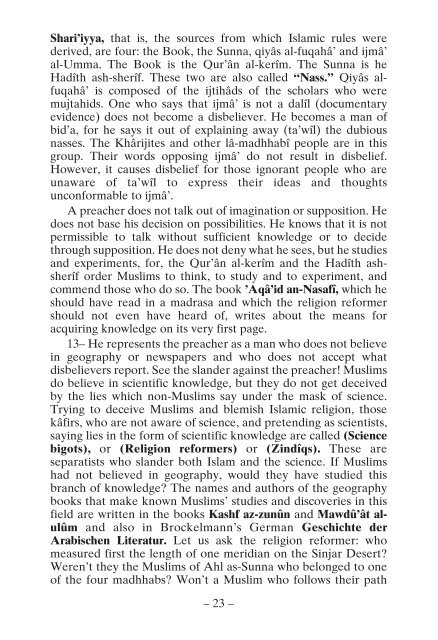Answer to an Enemy of Islam
Answer to an Enemy of Islam This is a refutation of the lies and slanders which the lâ-madhhabî Rashîd Rıdâ of Egypt, who appeared in the disguise of a religious man and wrote against the scholars of Islam in his book Muhâwarât.
Answer to an Enemy of Islam
This is a refutation of the lies and slanders which the lâ-madhhabî Rashîd Rıdâ of Egypt, who appeared in the disguise of a religious man and wrote against the scholars of Islam in his book Muhâwarât.
You also want an ePaper? Increase the reach of your titles
YUMPU automatically turns print PDFs into web optimized ePapers that Google loves.
Shari’iyya, that is, the sources from which <strong>Islam</strong>ic rules were<br />
derived, are four: the Book, the Sunna, qiyâs al-fuqahâ’ <strong>an</strong>d ijmâ’<br />
al-Umma. The Book is the Qur’ân al-kerîm. The Sunna is he<br />
Hadîth ash-sherîf. These two are also called “Nass.” Qiyâs alfuqahâ’<br />
is composed <strong>of</strong> the ijtihâds <strong>of</strong> the scholars who were<br />
mujtahids. One who says that ijmâ’ is not a dalîl (documentary<br />
evidence) does not become a disbeliever. He becomes a m<strong>an</strong> <strong>of</strong><br />
bid’a, for he says it out <strong>of</strong> explaining away (ta’wîl) the dubious<br />
nasses. The Khârijites <strong>an</strong>d other lâ-madhhabî people are in this<br />
group. Their words opposing ijmâ’ do not result in disbelief.<br />
However, it causes disbelief for those ignor<strong>an</strong>t people who are<br />
unaware <strong>of</strong> ta’wîl <strong>to</strong> express their ideas <strong>an</strong>d thoughts<br />
unconformable <strong>to</strong> ijmâ’.<br />
A preacher does not talk out <strong>of</strong> imagination or supposition. He<br />
does not base his decision on possibilities. He knows that it is not<br />
permissible <strong>to</strong> talk without sufficient knowledge or <strong>to</strong> decide<br />
through supposition. He does not deny what he sees, but he studies<br />
<strong>an</strong>d experiments, for, the Qur’ân al-kerîm <strong>an</strong>d the Hadîth ashsherîf<br />
order Muslims <strong>to</strong> think, <strong>to</strong> study <strong>an</strong>d <strong>to</strong> experiment, <strong>an</strong>d<br />
commend those who do so. The book ’Aqâ’id <strong>an</strong>-Nasafî, which he<br />
should have read in a madrasa <strong>an</strong>d which the religion reformer<br />
should not even have heard <strong>of</strong>, writes about the me<strong>an</strong>s for<br />
acquiring knowledge on its very first page.<br />
13– He represents the preacher as a m<strong>an</strong> who does not believe<br />
in geography or newspapers <strong>an</strong>d who does not accept what<br />
disbelievers report. See the sl<strong>an</strong>der against the preacher! Muslims<br />
do believe in scientific knowledge, but they do not get deceived<br />
by the lies which non-Muslims say under the mask <strong>of</strong> science.<br />
Trying <strong>to</strong> deceive Muslims <strong>an</strong>d blemish <strong>Islam</strong>ic religion, those<br />
kâfirs, who are not aware <strong>of</strong> science, <strong>an</strong>d pretending as scientists,<br />
saying lies in the form <strong>of</strong> scientific knowledge are called (Science<br />
bigots), or (Religion reformers) or (Zindîqs). These are<br />
separatists who sl<strong>an</strong>der both <strong>Islam</strong> <strong>an</strong>d the science. If Muslims<br />
had not believed in geography, would they have studied this<br />
br<strong>an</strong>ch <strong>of</strong> knowledge? The names <strong>an</strong>d authors <strong>of</strong> the geography<br />
books that make known Muslims’ studies <strong>an</strong>d discoveries in this<br />
field are written in the books Kashf az-zunûn <strong>an</strong>d Mawdû’ât alulûm<br />
<strong>an</strong>d also in Brockelm<strong>an</strong>n’s Germ<strong>an</strong> Geschichte der<br />
Arabischen Literatur. Let us ask the religion reformer: who<br />
measured first the length <strong>of</strong> one meridi<strong>an</strong> on the Sinjar Desert?<br />
Weren’t they the Muslims <strong>of</strong> Ahl as-Sunna who belonged <strong>to</strong> one<br />
<strong>of</strong> the four madhhabs? Won’t a Muslim who follows their path<br />
– 23 –

















